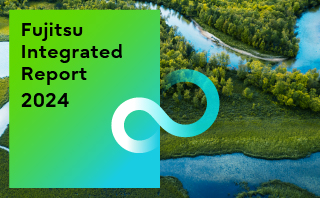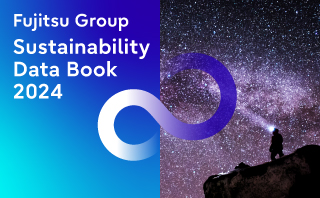-
Sustainability at Fujitsu Group
- Sustainability Management in the Fujitsu Group
- GRB(Global Responsible Business)Goals for FY2025
- GRB(Global Responsible Business)Goals and Achievments for FY2022
- Fujitsu's accessibility
- Stakeholder Engagement
- United Nations Global Compact
- SDG-related Activities in Fujitsu
- External Recognition and Awards
-
Global Responsible Business
- Environment
-
- Environmental Management
- The Fujitsu Group Environmental Vision on Climate Change
- Living in Harmony with Nature (Conservation of Biodiversity)
- Environmental Action Plan
- Environmental Data
- Environmental Communication
- Environmental Social Activities
- Disposal and Recycling of ICT products
- Environmental Considerations in ICT Products
- Governance
-
Data and Documents
- Fujitsu Group Sustainability Data Book 2024
- Social, Governance and Environmental data
- Independent Assurance Report

- GRI Standards / United Nations Global Compact (UNGC) principles Comparison Table
- SASB Standards Comparison Table
- Sustainability Information Disclosure Framework
- Link to regions responsible business reports
- Contact
- Sitemap
Human Rights
WHAT FUJITSU ASPIRES TO BE
In both the real-world and digital societies, consideration for "human dignity" is reflected in all our corporate activities and we constantly work to "create human-centric value."
GOALS FOR FY2025
Prevent and mitigate Human Rights risks throughout our value chain
- Conduct continuous Human Rights e-learning courses (maintain an attendance rate of 90% or more)
- Hold annual Stakeholder Dialogue sessions
- Work with our partners, customers and NGOs to establish activities that enable Human Rights, using Fujitsu’s expertise and technologies
- Our Approach
- Organizational Structure and Regular Reviews
- Conducting Human Rights Due Diligence
- Assessment of Human Rights Impacts
- Initiatives to Prevent or Mitigate Negative Human Rights Impacts
- Tracking the effectiveness of measures
- Dialogue with Stakeholders
- Framework for Reporting and Consulting on Human Rights Issues
- Human Rights Initiatives in Communities
Our Approach
Code of conduct
The shared values articulated in the Fujitsu Way’s Code of Conduct serve as guidelines for each employee to follow in their daily business operations. Prime among them is "We respect human rights," a principle that underpins all our corporate activities. By promoting management that respects human rights, we strive to embed this concept as an integral part of the day-to-day actions of all employees within the group.
Human Rights Statement
In 2014, the Fujitsu Group released the “Fujitsu Group Human Rights Statement” and revised it in 2022. It states that senior management is committed to upholding international norms on human rights, complying with laws and regulations, conducting ongoing human rights due diligence, and engaging in dialogue with stakeholders. It states that senior management is committed to upholding international norms on human rights, complying with laws and regulations, conducting ongoing human rights due diligence, and engaging in dialogue with stakeholders. We have notified our major suppliers of the revisions and request that they familiarize themselves with the revised Statement and comply with its content.
Fujitsu has publicly announced its support for the 10 principles of the United Nations Global Compact (*1) based on universal principles regarding human rights and rights at work, such as United Nations Guiding Principles on Business and Human Rights, the Universal Declaration of Human Rights and the International Labour Organization’s (ILO) Declaration on Fundamental Principles and Rights at Work. We have also made public announcements regarding the Modern Slavery Acts passed in the UK and Australia.
- (*1)Ten principles of the United Nations Global Compact:
The compact identifies 10 principles that corporations should uphold in four areas: human rights, labor practices, the environment and anti-corruption.
Organizational Structure and Regular Reviews
A Division dedicated to Human Rights has been established within the CEO Office, which reports directly to the President. This group promotes activities that address human rights issues across the value chain in collaboration with corporate and business divisions. The group has established a system of regular meetings with human rights personnel in each region to promote global initiatives.
Activities are reported to and discussed by the Sustainability Management Committee (chaired by the CEO), and the results are then shared with the Executive Management Council and the Board of Directors.
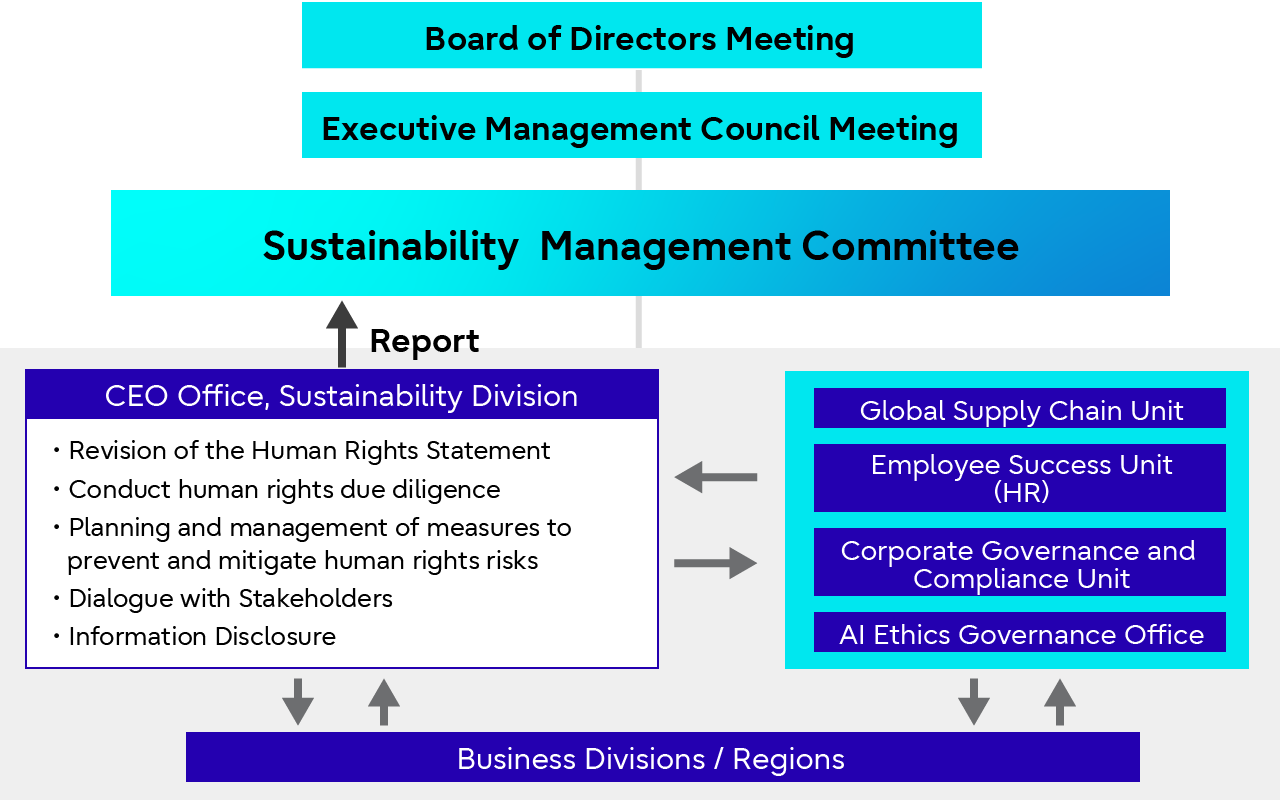 Structure for Promoting Activities Aimed at Resolving Human Rights Issues
Structure for Promoting Activities Aimed at Resolving Human Rights Issues
Conducting Human Rights Due Diligence
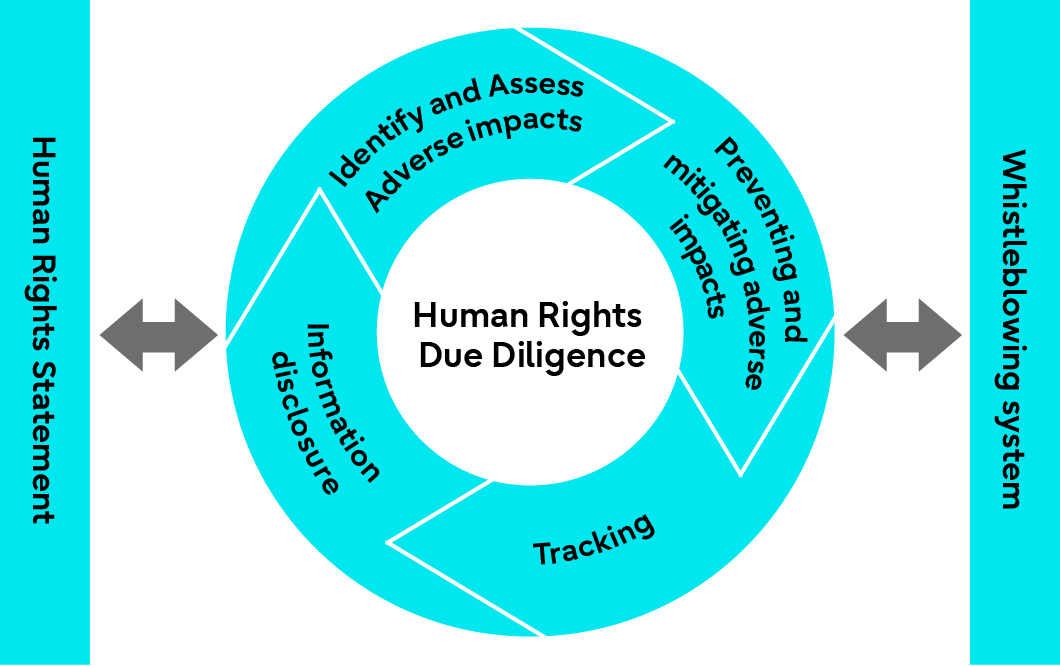 Human Rights Respect Promotion Framework
Human Rights Respect Promotion Framework
In accordance with the "Fujitsu Group Human Rights Statement," the Fujitsu Group is conducting “Human Rights Due Diligence.” We work continuously to identify human rights risks associated with our business activities, implement measures to prevent and mitigate negative impacts, and regularly monitor the progress of those measures to ensure their effectiveness. Information on the actions we take is disclosed in our Integrated Report and Sustainability Data Book.
When a new corporate acquisition is made, we carry out due diligence with respect to sustainability, including human rights. We also take steps to mitigate any risk of human rights violations and ensure that the Fujitsu Group human rights initiatives are fully embraced.
Assessment of Human Rights Impacts
To maximize the effectiveness of human rights due diligence in the Fujitsu Group, we conduct regular Human Rights Impact Assessments.
Working with Business for Social Responsibility (BSR), an international NPO, the main business activities of the Fujitsu Group were reviewed, and interviews were conducted with each region, corporate division and business division to compile a list of human rights risks. These issues were then prioritized in terms of severity, likelihood of occurrence, and relevance to the business. The most recent Human Rights Impact Assessment identified priority issues such as: “Employee working environment, health and safety,” “Forced labor and child labor in the supply chain,” and “Data privacy and information security in business.”
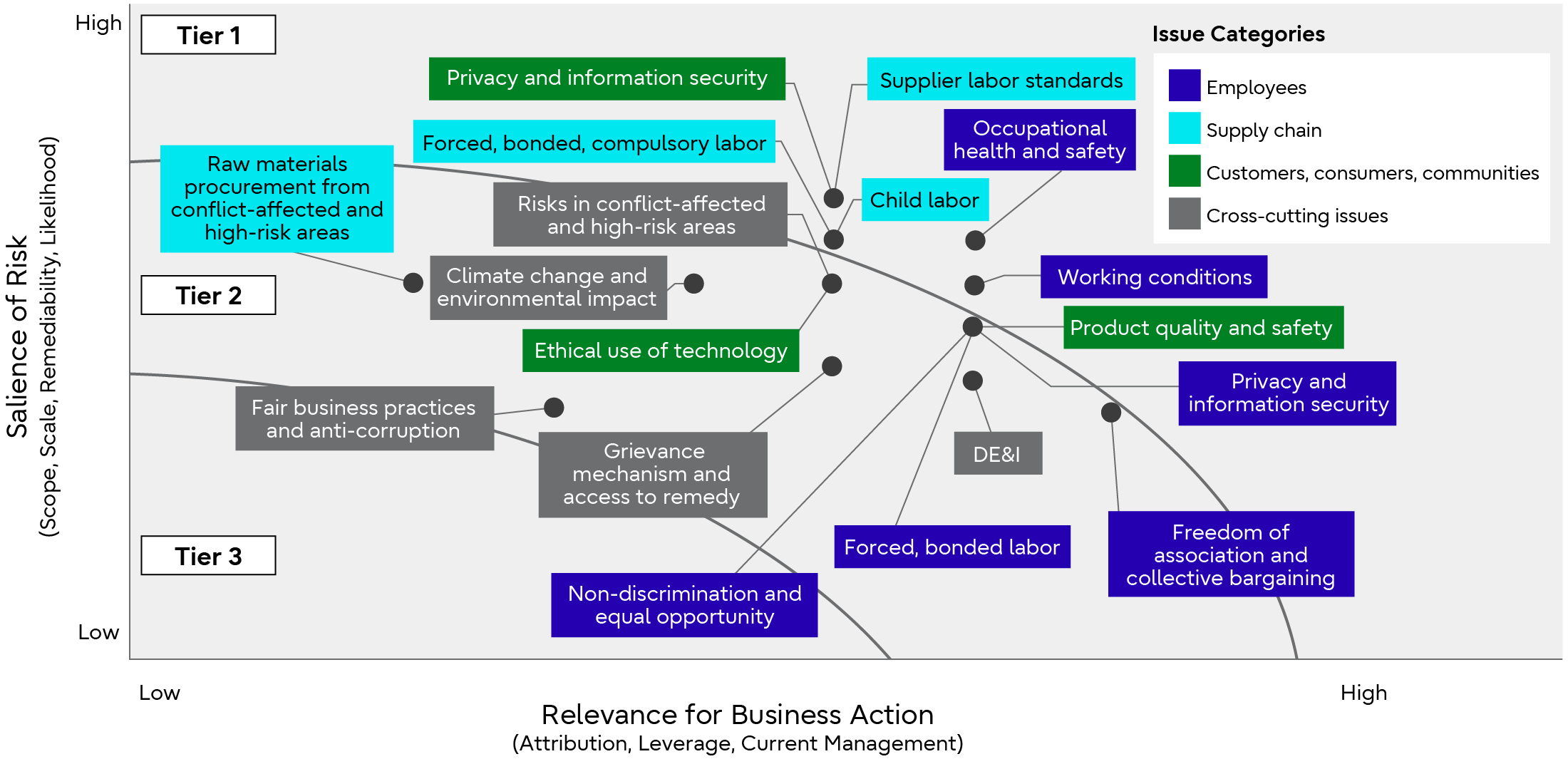 Human Rights Issues Identified Through Human Rights Impact Assessment (2022)
Human Rights Issues Identified Through Human Rights Impact Assessment (2022)
Initiatives to Prevent or Mitigate Negative Human Rights Impacts
Supply Chain
The Fujitsu Group requires that all its suppliers support the Fujitsu Group Human Rights Statement. The Group additionally requires them to support the prohibition of human trafficking, forced and child labor and discrimination, to support freedom of association and collective bargaining rights, and to promote policies such as pay equity.
| Risk | Initiative | Achievements in FY2023 | |
|---|---|---|---|
| Supply chain work environment |
|
|
|
| Forced labor・Child labor |
|
|
|
| Dealing with high-risk minerals |
|
|
|
Employees
The Fujitsu Group takes the rights of all its employees very seriously and complies with the core labor standards set out by the ILO. It will not discriminate on the basis of race, skin color, religion, beliefs, gender, social status, family origin, disability, sexual orientation or gender identity, birthplace, age, or any other factor that is not related to legitimate business interests.
| Risk | Ongoing initiatives | |
|---|---|---|
| Work environment |
|
UK: Developed a “Work Your Way” commitment that includes weekly ‘well-being’ hours, opportunities to work core hours, a system of up to four weeks per year working in different countries (with approval), and protection of meeting-free time to concentrate on work
|
| Non-discrimination and equal opportunity |
|
Human Rights Education and Awareness-Building
Education
| Purpose | Target audience | Attendance rate | |
|---|---|---|---|
| e-Learning on Business and Human Rights | To develop an understanding of how to conduct business in a way that respects human rights, and to learn the basics of recognizing and acting on the risks of human rights violations | All employees of the Fujitsu Global group of companies | 92% (FY2021) |
| AI Ethics Course 2023: Learning from Business Case Studies, Including Generative AI | To learn about business cases and trends in generative AI, and be able to explain to others the importance of AI Ethics | All employees of Fujitsu Japan’s group companies | 93% (FY2023) |
| e-Learning on Workplace Management | Learn the essential knowledge and mindset for workplace management to create a comfortable working environment (harassment prevention, mental health, labor time management, etc.). | Employees in leadership roles of Fujitsu Japan’s group companies | 98% (FY2023) |
Awareness-raising and webinars
Fujitsu and its group companies in Japan hold training and awareness-raising activities on various occasions. These include sessions for new hires, staff promotions (covering new hires, career hires, newly appointed executives, and directors), and management training for senior executives. We also organize events such as awards for human rights awareness slogans on Human Rights Day, along with webinars. We are a member of a voluntary organization called the Industrial Federation for Human Rights, Tokyo. We work together with the many member companies to promote mutual learning so that respect for human rights becomes an integral part of our corporate culture and engage in activities conducive to awareness-building from a corporate perspective.
| Outline | |
|---|---|
| Human Rights Day 2023 | Panel discussion with customers and partners to explore risks and business opportunities surrounding “Business and Human Rights in the Supply Chain.” |
| Establishing and sustaining a culture of human rights into the future | Hosted a webinar with presentations from external experts. The talk centered on the need for various approaches, including education, advocacy, and policy development at all levels of society to strengthen and sustain a culture of human rights into the future. |
Customers and End Users
Because the Fujitsu Group shoulders considerable responsibility as an IT developer and supplier, we devote a great deal of effort to deepening our understanding of the potential negative impacts of the many and diverse human rights issues entailed by advanced IT such as AI, and to minimizing those impacts. This applies to areas such as data security, privacy protection, and the ethical use of data.
| Risk | Ongoing initiatives | |
|---|---|---|
| Privacy and data security |
|
|
Initiatives on Ethical AI
The rapid progress of AI is resulting in dramatic changes to people’s lives and the communities in which they live. While this innovative technology offers new solutions to social and environmental problems, it remains a “black box” process where people do not understand how its outcomes are achieved. Another issue is that the large volumes of data involved in that process can include inherent biases, which the technology encourages. Even when used with care, AI can lead to unforeseen consequences for people. There have been reports of cases of wrongful judgment due to misidentification by AI as well as ethical issues such as inequality of access, which can erode people’s trust in AI. This is why the Fujitsu Group considers it an essential part of its responsibility as an AI researcher, developer, provider and operator to make AI solutions that are not only powerful to improve our society, but that are also safe and secure.
The Fujitsu Group has long advocated a ‘human centric’ approach and argued that information technology should fundamentally be used to focus on, and to benefit, people. In March 2019, as a reflection of the rapid recent development of AI technologies, the Fujitsu Group formulated and announced the "Fujitsu Group AI Commitment". As one of the companies which carries out AI-related businesses including research, development, provision and operation activities, we aim to emphasize the importance of communication with a wide range of stakeholders in the community, including users and consumers, as we distribute the enormous value of AI to society. For that purpose, the commitment outlines our promises with customers and the community.
The Fujitsu Group has identified the ethical risks listed below arising from the use of AI, and is formulating mitigation measures to address emerging risks that could significantly impact our future business.
Emerging Risks
The Ethical Risks of Utilizing AIDescription As a company that has been researching, developing, providing, and operating AI technologies since before the 1980s, Fujitsu has long asserted that information technology must be used in a human-centered manner. In recent years, there have been reports of troubling instances whereby ethical problems have arisen from the use of AI in the handling of privacy information. Examples include discrimination and unfairness due to negative outputs caused by biased training data. Such cases can undermine people’s trust in AI. Fujitsu therefore considers it an essential part of its responsibility as an AI researcher, developer, provider and operator to offer AI that is convenient, safe and secure to use. Impact As we see the widespread use of AI increasing with unprecedented speed, particularly in the case of generative AI, there is also a risk that users and consumers who have experienced issues with AI provided by Fujitsu may file claims for damages and thereby harm the Fujitsu Group’s reputation. In addition, the European Union's Artificial Intelligence Act (AI Act) requires developers, users, and other stakeholders to take strict action based on the level of risk that their AI systems could pose to the enjoyment of human rights. Violations could result in penalties, including fines of up to 7% of total global sales. This makes implementing appropriate risk management in the development and operation of AI systems essential. (in June 2024) Mitigating actions The Company established the “Fujitsu Group External Advisory Committee on AI Ethics” as a body that meets regularly and engages in ongoing dialogue with stakeholders from society. Part of this dialogue involves feedback on the “Fujitsu Group AI Commitment”, which serves as the Group’s AI ethical guidelines.
The Company also participates in international discussions on AI Ethics through its membership in AI4People and other forums. By virtue of these risk mitigating actions, Fujitsu Group management and staff can become aware of the ethical risks of AI and understand the precautions needed when researching, developing, providing, and operating AI. By minimizing the likelihood of situations that might cause inconvenience to users and customers, we can foster people’s trust in AI.
As a company that researches, develops, provides, and operates AI technologies, we aim to communicate knowledge about the rich value that AI brings, while emphasizing dialogue with a wide range of social stakeholders, including users and consumers.
Promotion and Practical Application of AI Ethics
As stipulated by the policies laid down in the “Fujitsu Group AI Commitment”, the Fujitsu Group conducts education and training activities across the entire company and includes content that considers the latest as well as specific AI-related issues.
Because we believe it is crucial that C-level management recognizes the importance of AI Ethics in order to establish a corporate culture which promotes AI Ethics, the Fujitsu Group has set up the “Fujitsu Group External Advisory Committee on AI Ethics”, which comprises external experts in the field, to objectively evaluate AI Ethics initiatives in the Group. A summary of the committee’s discussions is shared with the Board of Directors Meeting, incorporating the group's efforts for AI Ethics into its corporate governance framework and allowing for ongoing review and improvement.
- Fujitsu Establishes the Fujitsu Group External Advisory Committee on AI Ethics to Ensure the Safe and Secure Deployment of AI in Society
- Trustworthy AI and a Prosperous Society Created Together with the “Fujitsu Group External Advisory Committee on AI Ethics”
- Fujitsu AI Ethics Governance
- Fujitsu Establishes AI Ethics and Governance Office to Ensure the Safe and Secure Deployment of AI and Leading-edge Technologies in Society
- AI Ethics: AI Ethics from Principles to Practical Implementation - Trustworthy AI Design & Auditing
- Fujitsu Delivers New Resource Toolkit to Offer Guidance on Ethical Impact of AI Systems
Achievements in FY2023
| Corporate initiatives focused on AI Ethics, with management’s involvement |
|
|---|---|
| Integration of AI Ethics within the Group through AI Ethics training and practice |
|
| Fostering Ethical AI in Society by Sharing Fujitsu's Advanced AI Ethics Initiatives |
|
Tracking the effectiveness of measures
ISO26000-based Written Surveys
We undertake written surveys of group companies in Japan and other countries based on the ISO 26000 standard to check on the status of initiatives promoting respect for human rights. In FY2022, we conducted surveys at 6 facilities and 79 global group companies to assess the progress of human rights and work practices programs with the aim of identifying problems and helping to expand such programs company-wide. We also conducted a survey of 21 overseas group companies in FY2020 investigating working hours, wages, privacy and reporting systems.
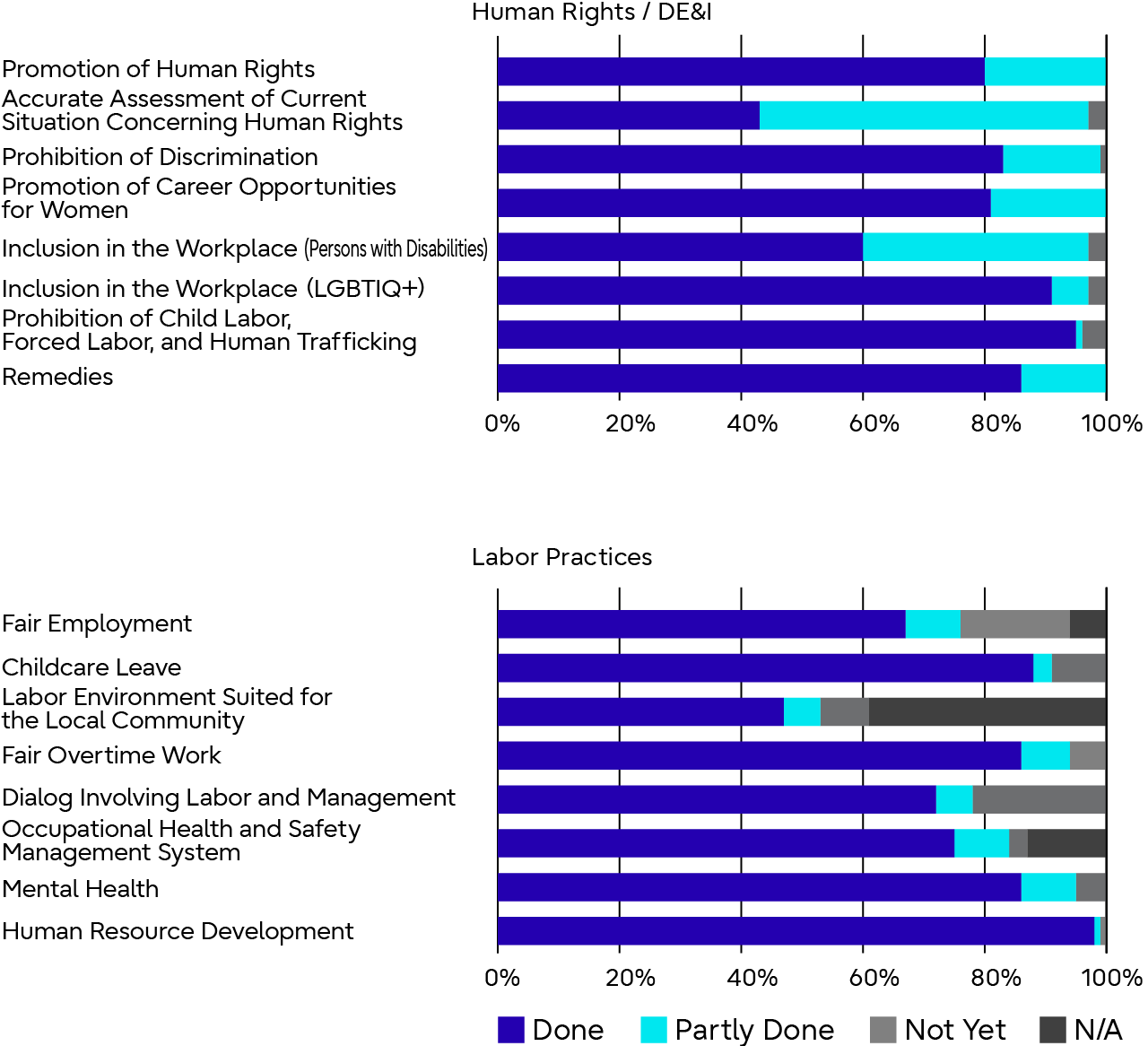 Results of Fujitsu Group Internal Survey (Human Rights/ DE&I, Labor Practices)
Results of Fujitsu Group Internal Survey (Human Rights/ DE&I, Labor Practices)
RBA Auditing
The RBA (Responsible Business Alliance) is a CSR alliance composed mainly of global electronics companies. Its purpose is to eliminate human rights abuses and environmental degradation in the global supply chain. Its Code of Conduct is a set of standards for responsible behavior that companies must observe, including respect for human rights.
Since joining the RBA in 2017, the Fujitsu Group has been working both internally and with suppliers to promote responsible business practices and build responsible supply chains, including incorporating the RBA Code of Conduct into the Fujitsu Group Sustainable Procurement Policy.
The RBA Validated Audit Process (VAP) audit is an assessment by third-party auditors to ensure that an employment site is properly operated in accordance with the RBA Code of Conduct. The Fujitsu Group's server and storage facilities at Kasashima (Ishikawa) and Hobara (Fukushima) underwent a VAP audit in FY2023 and received Gold Status and Silver Status respectively, certifying them as having a safe and secure working environment with a high level of respect for workers' human rights.
The audit did identify a few non-compliances such as “Failure to inspect first aid kits at certain non-manufacturing sites” (Kasashima factory), “Failure to conduct evacuation drills at sunset” and “Some faulty Emergency lights” (Hobara factory), but remedial action has since been taken and all sites now comply with the RBA Code of Conduct.
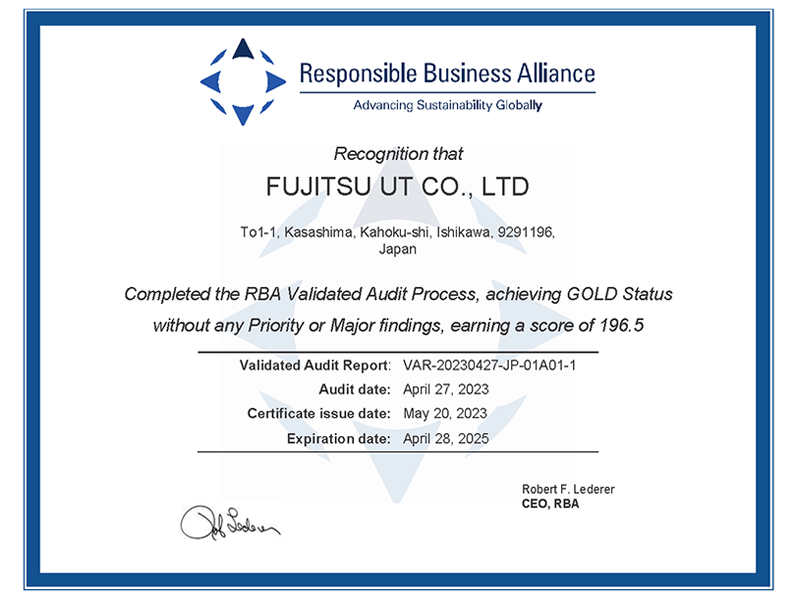 Kasashima facility
Kasashima facility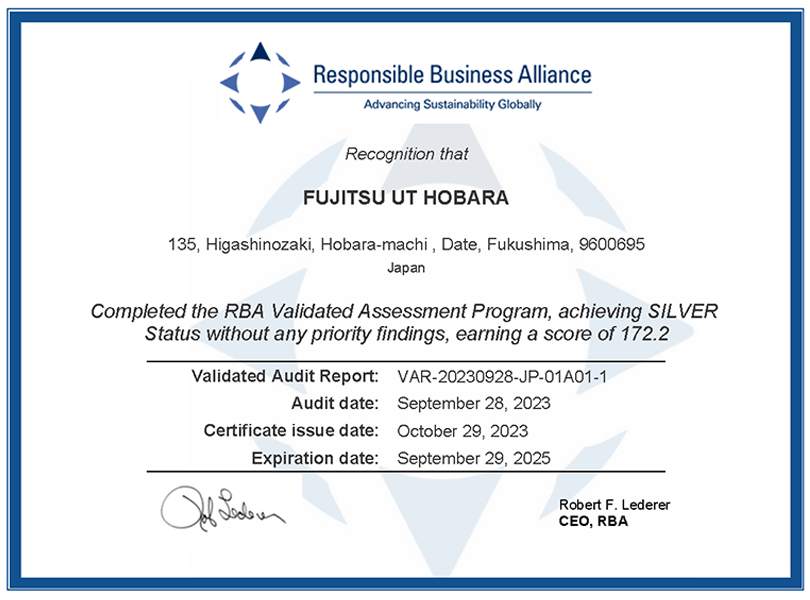 Hobara facility (Currently: Fsas Technologies Inc.; facility located in Hobara-machi, Fukushima Prefecture)
Hobara facility (Currently: Fsas Technologies Inc.; facility located in Hobara-machi, Fukushima Prefecture)Dialogue with Stakeholders
The Fujitsu Group held a dialogue with external experts to canvass and evaluate suggestions on the Group's human rights initiatives. The Corporate Executive Office’s Sustainability Division led the dialogue. In addition to relevant divisions such as Supply Chain, Compliance, HR, and AI Ethics, participants from overseas regions also took part in the discussion.
Framework for Reporting and Consulting on Human Rights Issues
The Fujitsu Group conducts its business activities worldwide in close collaboration with local communities. Working with these communities, we have established systems to engage in human rights-related consultations and information gathering both inside and outside the company, in order to listen to and understand the opinions of various parties and reduce and prevent negative human rights impacts.
Consultation Service for Fujitsu Group employees in Japan ”Human Rights Consultation Service”
The Fujitsu Group has created an intranet-based system to consult with and accept input from all Fujitsu Group employees on human rights-related issues including harassment. Within Japan, Fujitsu has set up a Human Rights Consultation Service. The matters discussed are reported to the Human Rights Promotion Committee and regularly communicated to auditors, with careful consideration given to ensuring that personal information and privacy are respected. The objectives are to understand the utilization status of this consultation service and to put in place initiatives designed to prevent recurrences of any breaches.
Whistle blowing platform for a wide range of stakeholders ”JaCER Engagement and Remedy Platform Contact Desk”
Since November 2023, the Fujitsu Group has been participating in the Engagement and Remedy Platform, operated and provided by Japan Center for Engagement and Remedy on Business and Human Rights (JaCER), to receive complaints and reports on human rights from a wide range of stakeholders (*2). JaCER aims to provide a non-judicial platform for grievance redress and to act in a professional capacity to support and promote redress of grievances by member companies based on the United Nations Guiding Principles on Business and Human Rights. By accepting complaints through third-party contact points, we aim to promote fairness and transparency in the handling of complaints and promote dialogue and redress more than ever before.
- (*2)Reports by Fujitsu Group employees regarding illegal activities, illegal transactions, and other non-compliance activities, as well as reports and consultations from Fujitsu Group employees, are accepted through Fujitsu Alert, not this Platform. Consultations on human rights are available at the Human Rights Consultation Service.
Human Rights Initiatives in Communities
QUEREMOS GRADUARNOS! (We want to graduate!) Educational support for young people living in one of the largest slums in South America (in Venezuela)
For many young people living in Petare, Venezuela, one of the largest slums in South America, studying is close to impossible, as is prioritizing education. School dropout rates are high, opportunities to turn to drugs and crime are rife, and very few young people go on to higher education.
Fujitsu has been supporting In Aid of the Children of Venezuela (Chamos)’s partnership with a local non-profit, Queremos Graduarnos (QG), to motivate children and young people to attend school. Chamos, in cooperation with Espacio Educa, offers weekly extracurricular classes in computer programming languages, software, and digital literacy. Fe y Alegria Maria Inmaculada College started offering the course in October 2023 and has accepted 43 young people so far.
“Fujitsu’s generosity to date has given young people the chance to improve their digital literacy skills, explore computer programming and most importantly gives them a sense of agency and self-belief. We work with vulnerable communities where over 80 percent of the population live below the poverty line and the majority have no access to technology or internet connection at home. So with Fujitsu, we have been able to provide foundational skills to close the stark inequality gap in Venezuelan society, as well as introducing computer programming for students with aspirations to work in a STEM-related field.”
-Mariana Siblesz de Alvarez, Chair at Chamos In Aid of the Children of Venezuela
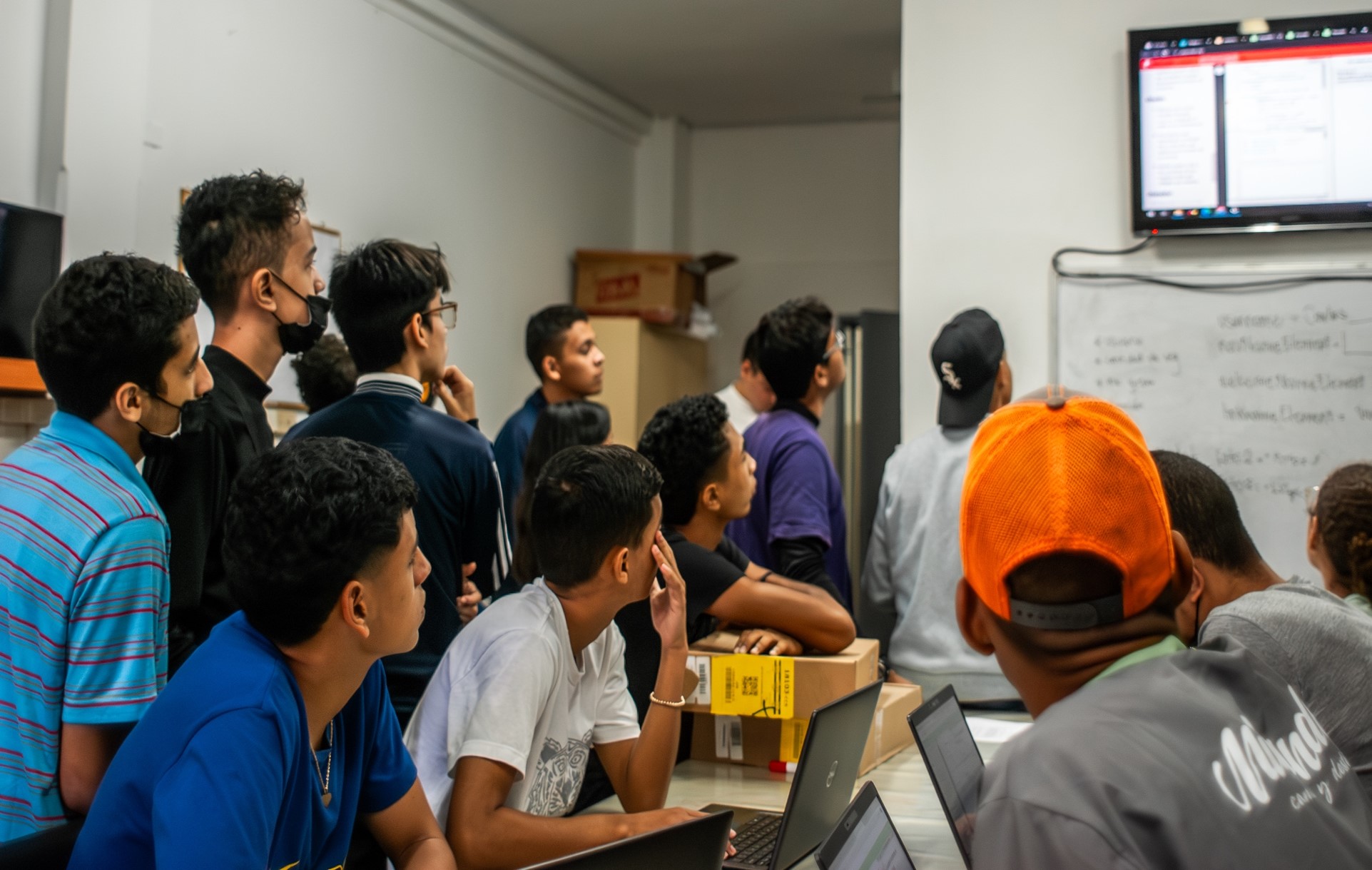
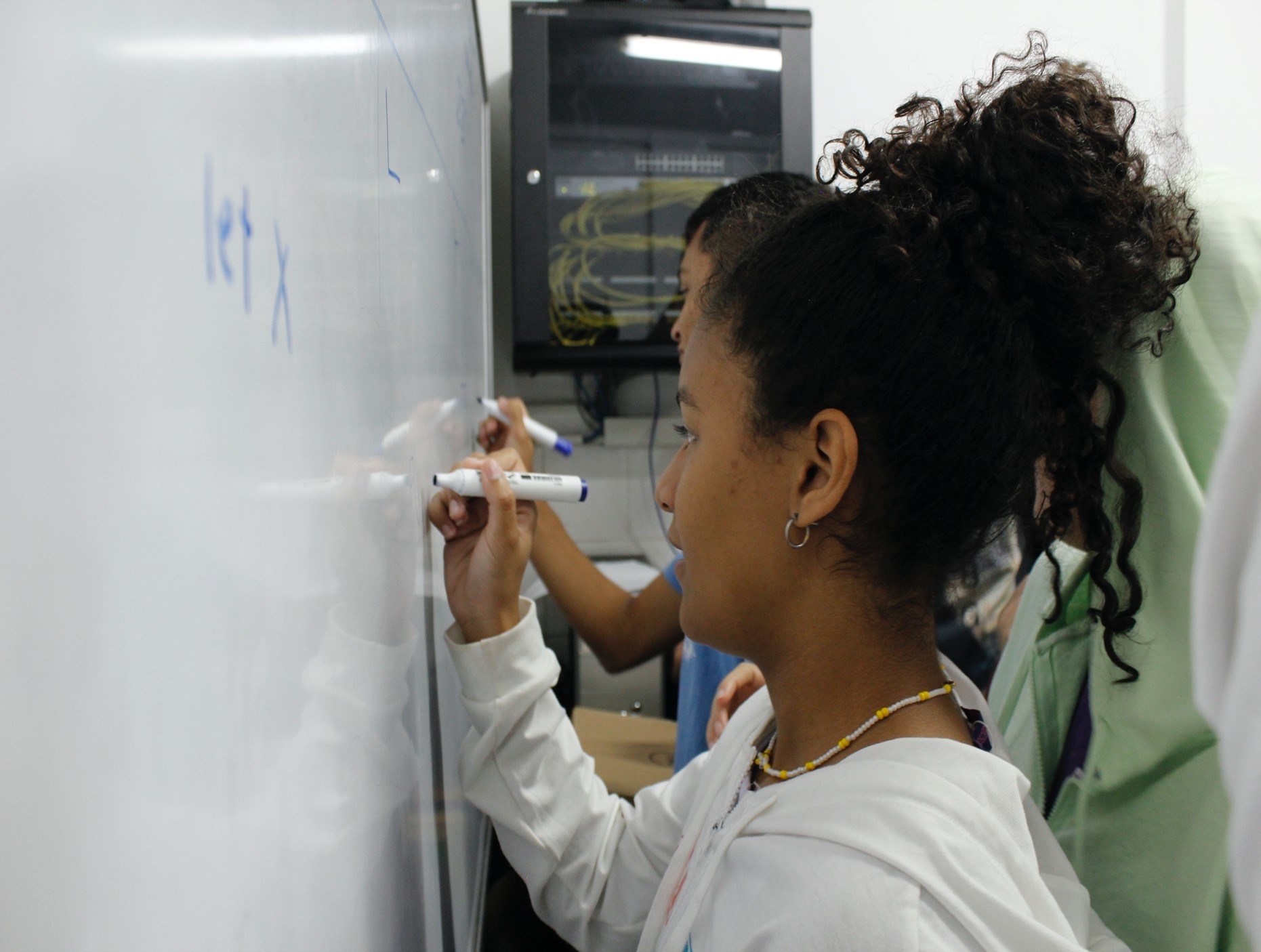
Young people from vulnerable environments taking classes
Digital literacy curriculum for Yemeni women and girls implemented by the International Rescue Committee (IRC) (in Yemen)
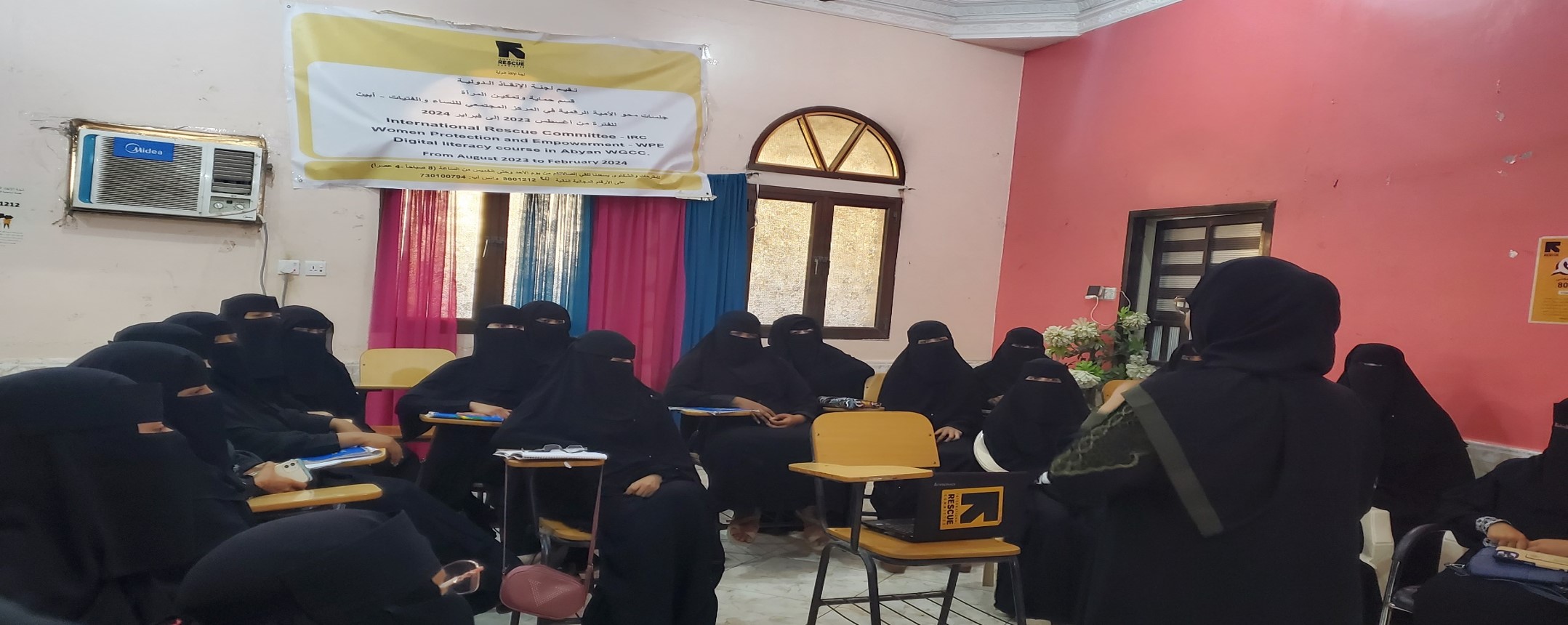 Women participating in the digital literacy curriculum
Women participating in the digital literacy curriculum
Fujitsu supports the IRC in its efforts to improve the digital literacy of women and adolescent girls. The pilot program in Khanfar, Yemen, funded through Fujitsu’s community investment fund concluded in 2023. The program provided digital literacy training to 50 women between the ages of 18 and 35, gaining valuable skills in navigating the digital space, from smartphone basics to online safety and information seeking. This opens new avenues for education, employment, and communication. The program overall helped improve access to information and opportunities as well as increase confidence and empowerment.
Creating equal opportunities and work opportunities for people with disability (in India)
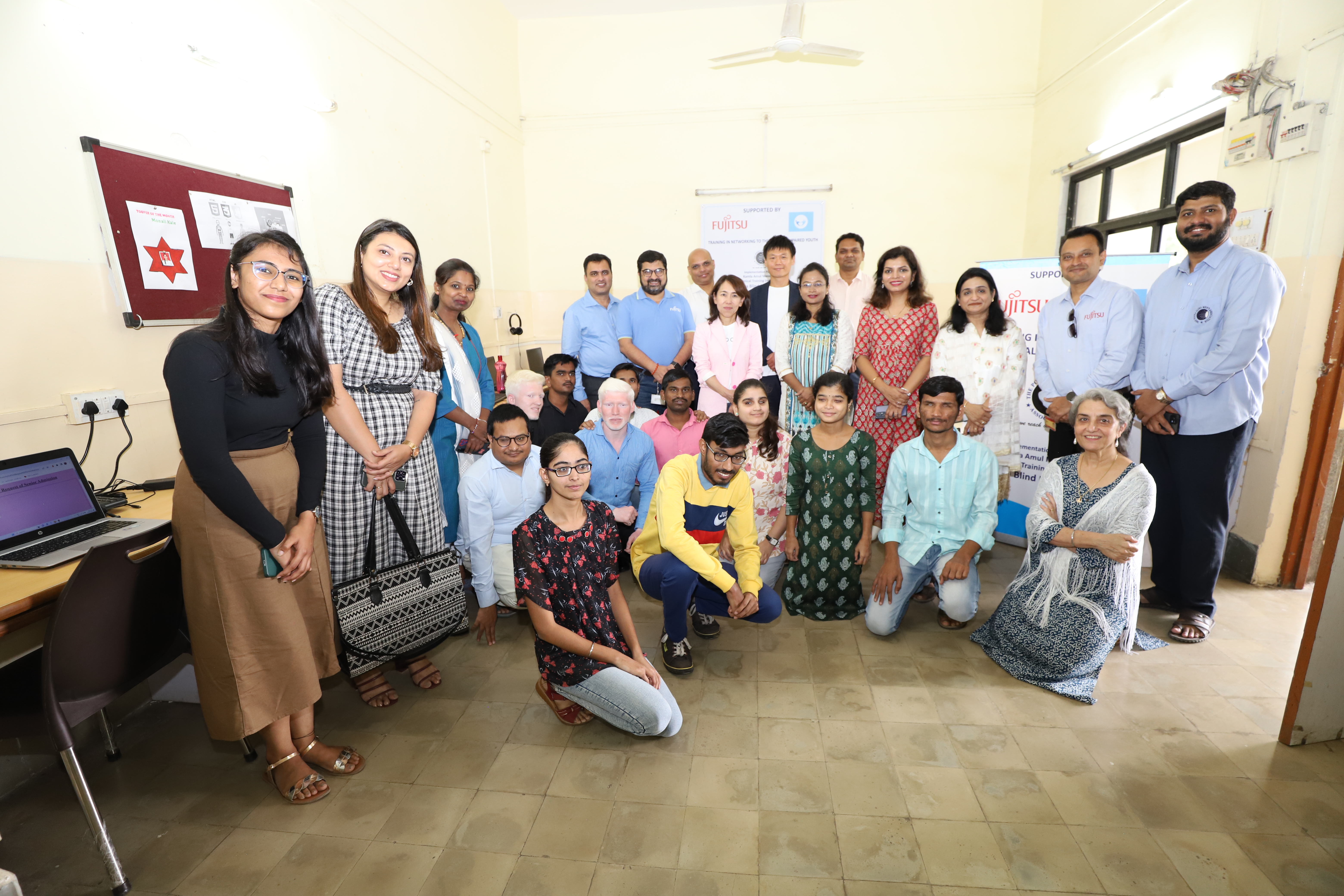 Megumi Shimazu (then a corporate executive officer, now COO) and program participats
Megumi Shimazu (then a corporate executive officer, now COO) and program participats
Fujitsu Consulting India (FCI), partnered with NFP organization Poona Blind Men's Association (PBMA) to assist 21 visually impaired students in their skills development journey within the field of IT, with a special focus on database management systems. The year-long program is implemented by PBMA and provides technical knowledge on database management systems and basic corporate skills such as effective communication, time management, stress management, and EQ.

